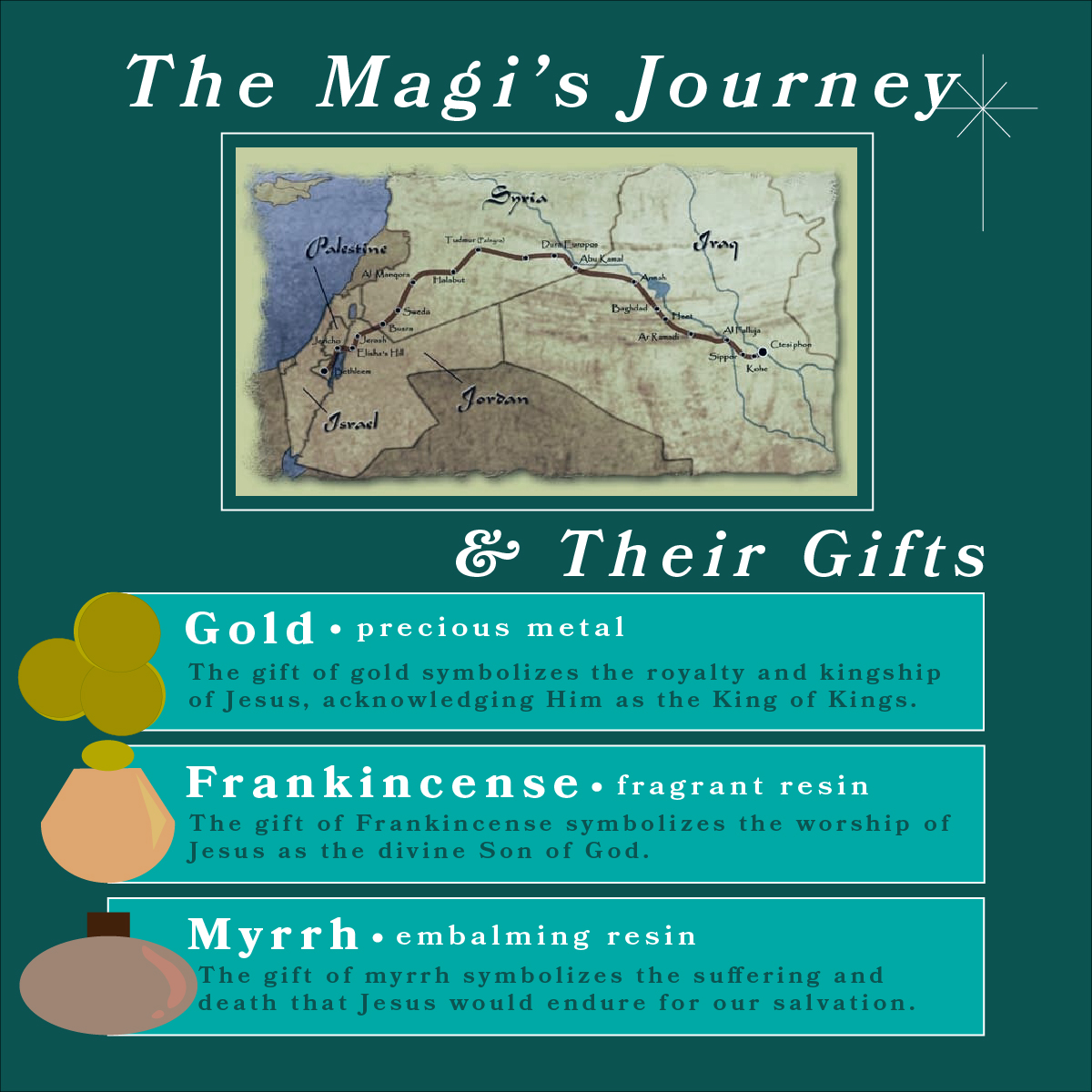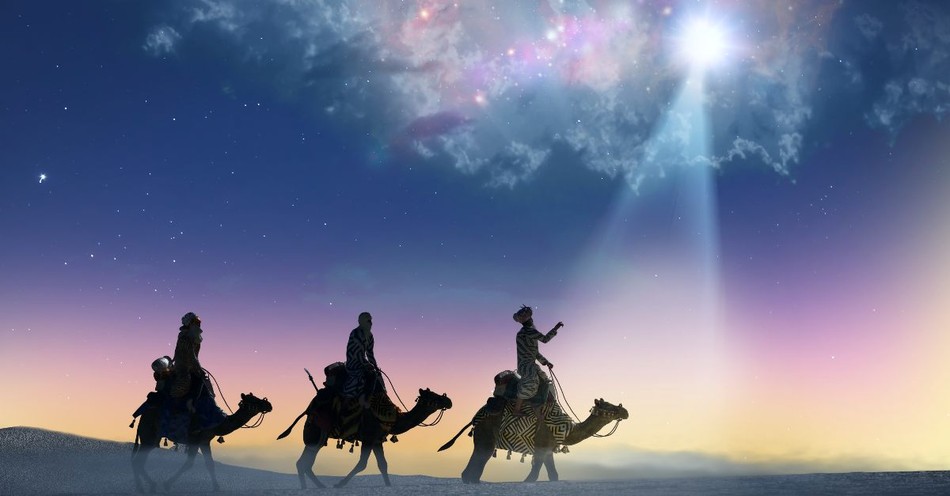Most people know the Three Wise Men as men from the east who followed a star to find the newborn Christ. But who were these three men? Where did they come from? What was the true meaning of their presence in the Nativity?
After Jesus was born in Bethlehem in Judea, during the time of King Herod, Magi from the east came to Jerusalem and asked, “Where is the one who has been born king of the Jews? We saw his star when it rose and have come to worship him” (Matthew 2:1-2).
We see them in almost every Nativity scene — three men in glittering robes and crowns. If it is a living nativity at a church, the scene will include fake beards. And if not the “kings,” we see the star. We all know the “three wise men.”
The “Star of Bethlehem” is a common sight at Christmas. Indeed, even the “12 days of Christmas” tradition and song are derived from the story of the men who visited the baby Jesus from the east, all bearing gifts.
The Wise Men in the Bible
The Three Wise Men, also known as the Magi, are mentioned in the Bible in the Gospel of Matthew, Chapter 2. However, the Bible does not specify the exact number of wise men; it only mentions that they presented three types of gifts.
The Visit of the Wise Men (Matthew 2:1-12)
Now after Jesus was born in Bethlehem of Judea in the days of Herod the king, behold, wise men from the east came to Jerusalem, saying, “Where is he who has been born king of the Jews? For we saw his star when it rose[b] and have come to worship him.” When Herod the king heard this, he was troubled, and all Jerusalem with him; and assembling all the chief priests and scribes of the people, he inquired of them where the Christ was to be born. They told him, “In Bethlehem of Judea, for so it is written by the prophet:
“‘And you, O Bethlehem, in the land of Judah,
are by no means least among the rulers of Judah;
for from you shall come a ruler
who will shepherd my people Israel.’”Then Herod summoned the wise men secretly and ascertained from them what time the star had appeared. And he sent them to Bethlehem, saying, “Go and search diligently for the child, and when you have found him, bring me word, that I too may come and worship him.” After listening to the king, they went on their way. And behold, the star that they had seen when it rose went before them until it came to rest over the place where the child was. When they saw the star, they rejoiced exceedingly with great joy. And going into the house, they saw the child with Mary his mother, and they fell down and worshiped him. Then, opening their treasures, they offered him gifts, gold and frankincense and myrrh. And being warned in a dream not to return to Herod, they departed to their own country by another way.
Names of the Three Wise Men
Perhaps if Luke, the doctor/historian, had written about them in his Christmas account, we might have had more details. But Matthew’s story is quite vague and shrouded in mystery. Where did they come from? “The east” is hardly specific.
The names traditionally associated with the Three Wise Men are:
Melchior: Often depicted as an older man, he is said to have brought the gift of gold.
Gaspar (or Caspar): Represented as a young man, he is traditionally associated with the gift of frankincense.
Balthazar: Depicted as middle-aged, he is said to have presented the gift of myrrh.
The account in the Gospel of Matthew describes how the Wise Men, also known as the Magi, saw a star in the East and followed it to find the newborn Jesus. They came to Jerusalem and inquired about the birth of the King of the Jews. King Herod, troubled by this news, asked the chief priests and scribes where the Messiah was to be born. They pointed to Bethlehem.
The Wise Men continued their journey and, guided by the star, found the child Jesus with Mary in Bethlehem.
What Gifts Did the Magi Bring Jesus?

The gifts brought by the Three Wise Men to Jesus—gold, frankincense, and myrrh—have been interpreted with various symbolic meanings throughout Christian tradition. While the Bible doesn't explicitly provide symbolic meanings, Christian theologians and scholars have offered interpretations that convey deeper spiritual significance. Here are common interpretations:
Gold: Gold is a precious metal associated with kingship and wealth. The gift of gold to Jesus is often seen as a symbol of his royalty and kingship. It acknowledges Jesus as the King of Kings and emphasizes his divine authority.
Frankincense: Frankincense is a fragrant resin used in incense and as an offering in religious ceremonies. The gift of frankincense is interpreted as a symbol of worship and the recognition of Jesus' divinity. It signifies the spiritual nature of Jesus and his role as a mediator between God and humanity.
Myrrh: Myrrh is a resin with a bitter taste, often used in perfumes and for embalming. The gift of myrrh is seen as a foreshadowing of Jesus' sacrificial death. It symbolizes the suffering and mortality of Jesus, as myrrh was commonly used in the burial process. This gift is a reminder of the purpose for which Jesus came into the world—to offer salvation through his eventual death on the cross.
Together, these gifts are often viewed as representing the three aspects of Jesus' identity: his kingship, divinity, and sacrificial role. The Wise Men's act of presenting these gifts can be understood as an acknowledgment of Jesus' unique and multifaceted role in the salvation of humanity. The story emphasizes the universal significance of Jesus' birth, as the Wise Men came from the East, symbolizing the inclusion of the Gentiles in the message of Christ.
Meaning of the Term 'Magi'
The term magi is often referred to as astrologers or “men who studied the stars.” It should be noted that in that day, astronomy and astrology were quite interchangeable.
Whoever they were or wherever they came from, the Magi would have been men of great learning. The word itself comes from the Greek word “magos” — itself coming from an old Persian word, “magupati.”
This title was given to priests; thus, it could quite likely have been used to refer, more specifically, to priests of the Zoroastrian religion — a Persian (now Iranian) tradition. These priests were rather known for their skills in interpreting the night sky.
Thus, the Magi could well have been from Persia, which indeed was east of Jerusalem. Much of early Christian thought was along these lines. Many other traditions, though, have laid claim to the three kings. Babylon is often thought to be the birthplace of astrology.
Two of the gifts — frankincense and myrrh — were exotic spices more commonly found in Arabia. When the gift of gold is included, these luxurious gifts certainly further indicate that these visitors were people of great wealth and power.
They would have been very rich and held in high esteem by people who were not from their country or religion. Looking to the stars, one star, in particular, would have been very much in keeping with their religious tradition — looking to the heavens, the stars, and the planets for information about their god or gods. In other words, the Magi would have followed the patterns of the stars “religiously.”
As educated men, they would have been quite familiar with the Old Testament prophesies of a Jewish Savior, also known as the Messiah, from when the Jews had been held captive in ancient Babylon. Thus, they would have known of Balaam’s prophecy in Numbers 24:17, “…a star shall come out of Jacob and a scepter shall rise out of Israel…”
Then, they had seen an unusual new star in the western sky. Something different. Something they believed told of the birth of that special king in Israel. Their faith, their religion, and their education all required that they follow this star to see where it led.
Historically, the visit of the Magi has played an important role in Christmas celebrations around the world.
Different Traditions of Epiphany
Christmas Day is celebrated on December 25, but that is hardly the end of the Christmas story. In many Christian traditions, there are 12 days of Christmas, culminating on January 6, also known as the Feast of the Epiphany, or the day the “Magi” arrive to see the newborn king, baby Jesus.
This tradition comes from Matthew 2:11, which says, “On coming to the house, they saw the child with his mother Mary, and they bowed down and worshiped him.” Notice — they came “to the house…” not to the stable or manger. Joseph had already found a place for them to live.
The Feast of the Three Kings is celebrated in Spain and other Latin American countries. While socks are hung for Santa Claus, children put shoes out when it was said the three kings would put money in the shoes.
In Mexico, their version of the traditional King Cake — Rosca de Reyes — is eaten. In Argentina, Paraguay, and Uruguay, kids also put out grass and water for the camels belonging to the three kings. The morning of the sixth, they wake up to find the gifts left by the kings.
In Bulgaria and Greece, Three Kings Day starts with the Blessing of the Waters. Then, people jump into icy waters to retrieve a blessed cross. In many countries, there are celebrations with parades and festivals.
Armenians celebrate the Feast of the Nativity and Revelation of Jesus Christ on January 6. Christmas is not complete until gifts are opened on this special day.
Many scholars, in fact, attribute the names of the three kings to Armenian tradition: Gaspar (or Caspar), Melchior, and Balthasar. Legends are told about them, and often even descriptions are attached.
And we may not realize it now, but those names have an important meaning.
Celebrations of the Wise Men Today
Today, we have seemed to simply take them for granted. The three kings. The wise men. The Magi. Whatever you choose to call them, they have fallen into obscurity. Faded into the scenery of Christmas, not much more than a Christmas accessory.
Like the belt or socks that we got as a gift. Or the green bean casserole we’ll have with Christmas dinner. They’re a throw-in. We know they are there, but do we really know what they stand for anymore? What do — or should — the Three Kings mean to us?
While many of us don’t know the names of the Three Kings from the Bible, I believe they are important to the celebration of Christmas, as are the celebrations and the festivals around them.
Their names make it personal. These were real people in a real place and time. Educated people who realized exactly who it was they were visiting. They had ridden more than 2,000 miles on camels to come to see, honor, and bring their very best to the newborn King.
Can you even imagine that? Today, some days, we can’t offer Jesus more than a passing glance or a few minutes of our time.
Indeed, the Three Kings gave Jesus their best and finest. The Feast of the Epiphany is now mostly celebrated by Catholic and Orthodox Churches — it is a day that celebrates the revelation of God incarnate as Jesus Christ. God offering mankind mercy, grace, and reconciliation to Himself.
And the day that Gaspar, Melchior, and Balthasar — and perhaps many others — came to see the newborn King. Our Redeemer. Emmanuel — God with us.
For further reading:
Who Were the Wise Men of the Christmas Story?
What Is the Significance of the Three Wise Men and Their Gifts?
What Is the Significance of the Star of Bethlehem?
Photo Credit: ©iStock/Getty Images Plus/Denis-Art

Greg doesn’t pretend to be a pastor, a theologian, or a Bible expert, but offers the perspective of an everyday guy on the same journey as everyone else – in pursuit of truth.
Greg can be reached by email or on Facebook @ Greg Grandchamp - Author.



.jpg)